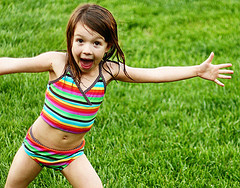"Happiness is not a matter of intensity but of balance and order and rhythm and harmony."
—Thomas Merton
Summer is a time of lovely things that look like bad habits once school rolls around again: sleeping late, staying at the park until dark, eating dinner in our bathing suits, falling asleep on the couch or in the car without preparing for the next day. I am all too aware of the fact that school starts again for my kids one week from today, and that our family needs to get back into our regular routine. I've written before about my belief that family happiness is all about being in good habits so that we don't have to beg and bribe our kids to do routine things, like brush their teeth. I want my family to be like a well-run school: kids are in the habit of washing their hands, helping out, putting their things away. The discipline of the school year has melted away this summer, and I can't wait to have it back.

Starting tonight. At dinnertime, we are going to talk about what habits we want to start working on again. Change rarely happens all at once, especially with my kids. Instead, it happens in stages. People who successfully create new, healthy habits—or who kick a difficult habit like smoking—do it one step at a time. Psychologists James Prochaska and Carlo DiClemente have been observing and describing the various stages of change for decades, and what they've learned is that if you start trying to impose change when you or your kids are in the wrong stage, the new habit won't stick.
For example, I'd like my kids to start getting up at 7:00 am again, and to get dressed before they come to breakfast. Come to think of it, I need them to get all ready for school without me having to goad and beg and prod. If I just announce to them my new policy they'll revolt—they LOVE eating breakfast in their pjs.
-
Stage One: Pre-Contemplation
This is the stage where no one is thinking about changing, and for my kids, it will end tonight at dinner when I raise the topic. -
Stage Two: Contemplation
We'll talk tonight about why we want to work on streamlining our get-ready-for-the-day routine. I'll ask them to contemplate why THEY might want to change things, too—what do they look forward to about the coming school year? (They'll say taking the bus.) What do they need to do so they don't miss the bus? We'll come up with a big, overarching goal, describing in vivid detail what a successful school morning will be like. -
Stage Three: Preparation
This stage is actually a transition from thinking about changing to actually beginning the new habit. I expect that we'll all plan to start setting our alarms again (well, I've been setting mine all summer, but I'll have to start setting it earlier again, so that I'm all ready for work by the time the kids get up).The kids are going to have to leave the house an hour earlier than they've been leaving for camp, so I'm going to have to reorganize our whole morning routine to support their behavior change in a way that doesn't involve me barking orders and then going downstairs to check my email. It doesn't seem like offering empathy, rationale, and choice is that hard (read this posting if you don't know what I'm talking about) when asking kids to do something—and it isn't—but it is so different than what comes naturally to my bossy self that I have think about what is likely to trigger my use of, uh, controlling language. If I don't leave enough time, I start saying things like, "Molly, please brush your teeth right now, or I'll take that book away from you" rather than: "I know you'd rather read that book—I would too! But I propose that you brush your teeth so you don't miss the bus."
-
Stage Four: Action
Going cold-turkey on lovely habits like oversleeping is unrealistic, so we'll need to divide our grand end-goal into lots of smaller ones. No amount of ERN encouragement is going to get my kids to wake up, get dressed, make their lunches, eat breakfast, brush their teeth and hair, put sunscreen on, and pack their backpacks as a matter of routine in one fell swoop. We need to start with one teeny-tiny micro-behavior at a time.
The important thing is that at each step we all succeed. This means breaking our big goal into an action-plan made up of tiny micro steps that eventually get you there. So tonight at dinner, join me with the first few stages of change: think of what happiness habit you'd like to create to start the school year, and think about what the first teeny, tiny steps will be to get there. Friday, I'll put up another posting about the plan for changing your lazy-days-of summer habits back into a ready-for-success school routine.
© 2009 Christine Carter, Ph.D.
Selected reference:
Prochaska, J., DiClemente, C. Changing for Good. New York: Collins, 2006.
Join the Campaign for 100,000 Happier Parents by signing this simple pledge.
Become a fan of Raising Happiness on Facebook.
Follow Christine Carter on Twitter
Subscribe to the Happiness Matters Podcast on iTunes.


Comments
I want to thank you for this posting as our son Kaleb is going to start his first day of kindegarten next Monday. Any advice we recieve about having a more organized household and getting the children to school on time and in good spirits is greatly appreciated.
Aaron Wilkison | 9:38 am, August 20, 2009 | Link
Thanks Christine. What do I do if my kids says, “I’m not looking forward to anything and school starts way too early!” In other words, how do I motivate my teenager? All I can come up with is, “if you are late to school they will give you detention.” Threat based. Ideas for older kids?
——-
LB | 10:35 am, August 21, 2009 | Link